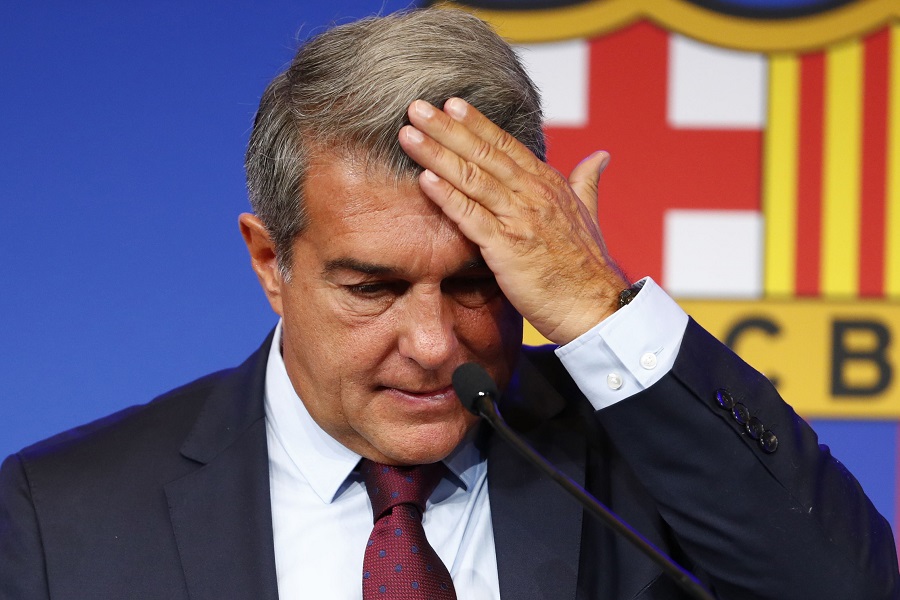January 10, 2011, the date Barcelona fans regard as perhaps the most important in the club’s history and the one that laid credence to the hardwork the club had put in developing the best players in the world at their famed academy, La Masia. Lionel Messi, Andres Iniesta and Xavi finished 1,2 and 3 in the 2010 Ballon d’Or vote for the previous calendar year, which was the first time an academy would produce all three finalists in the prestigious award on one night.
Barcelona, at the time, was regarded as the model club, using the core of academy graduates and complementing them with carefully identified players from around the world. Their model also put a lot of pressure on the likes of oil-rich Chelsea and Manchester City, who spent a lot of money to achieve success without giving their academy players a chance in the first team.
Ten years down the line, Barcelona is in a remarkable financial mess, having racked up a mammoth debt bill of €1.6bn as confirmed by president Joan Laporta. This massive debt has seen club legend, Lionel Messi leave on a free transfer, with the club unable to pay his wages despite a 50% agreed pay cut. The club is still unable to register Sergio Aguero, a free transfer arrival from Manchester City, as La Liga salary cap stipulations limit the amount a club can pay as salaries in comparison with its earnings.
Gone are the days when La Masia had a permanent place in the minds of decision-makers at the club, with the club, especially under the management of former president, Jose Maria Bartomeu favouring big-money signings primed for instant impact.
This article highlights the reasons why Barcelona has been plunged into this mess and what it can do to get out.
Covid-19 Pandemic
The Covid-19 pandemic affected a lot of clubs in Europe, but Barcelona is perhaps the most hit. The club rakes in a considerable income from matchday revenue, as its Camp Nou stadium is the biggest club stadium in the whole of Europe. It also rakes in a lot of money from merchandising and stadium tours. The club’s revenue dropped by €126m in 2020, which represented a 15% cut from its 2019 income.
The club also announced a reported loss of €203m due to the pandemic, with breakdowns of stadium (€67m), transfers (€29m), commercial (€72m), and TV (€35m). It even estimates a further €267m in 2021, which would amount to a €407m loss over two years.
Big-money signings with fat salaries and minimal output
Barcelona has made it a habit of spending big on players in the last few years, with one common theme among them: high expectations with critically underpar performances. The likes of Ousmane Dembele, Antoine Griezmann and Philippe Coutinho have all flattered to deceive, without consistently delivering performances that justify the huge amount they paid to purchase them.
In just 3 years, Barcelona has spent close to €1b on player transfers, well ahead of the likes of Juventus, Chelsea and Manchester City. They have also struggled to make money from player sales in the same period, as both Manchester clubs have higher net transfer spends. One crucial reason why Barcelona are in debt is also because most of these player buys were on credit, as their transfer debt moved from €64m in 20017 to €323m in 2020 because of player bonuses hinged not on performances but on appearances and trophies won.
The club’s playing squad is also bloated, as the club under Laporta seeking to take the focus back to the La Masia, and letting go of high-earning players such as Dembele, Coutinho, Griezmann, Umtiti and Pjanic. With the Covid pandemic still hampering a host of top European clubs, there have been no concrete offers for these players, meaning that they continue to earn huge while not contributing considerably to on-the-pitch success and even off-the-pitch such as player-focused club endorsement deals and even sales of merchandise such as jerseys and memorabilia.
This is all doom and gloom. Surely, there’s a way out
For Barcelona to get out of this mess they have placed themselves in, they’d have to combine a triumvirate strategy: looking for the best value for money transfer deals available, put more faith in the La Masia conveyor belt as well as be more strategic in its quest for on-pitch success.
Barcelona must look inward and know that their problems are inward, and first, they need to get those high-earning players off their wage bill. Once these players are off, they now need to concentrate on signing players that have resale value, as well as inexpensive players that have the potential to be world-beaters. La Masia must also be revamped to keep producing quality. There are more Ansu Fatis, Ricky Puigs and Oscar Minguezas in the academy: players who understand the culture at the club and what it means to put on the hallowed red-and-blue stripe. The board must be shrewd with money, and be very intentional about deals investors or partners push to them.
Finally, the fans must be patient and understand that these next few years will be transitional, and keep their expectations in check. The coach must be given time to work and implement his methods. They must also make Camp Nou a fortress again, and make then hallowed stadium uncomfortable for their opponents. The Blaugrana will rise again. It might only take time.
